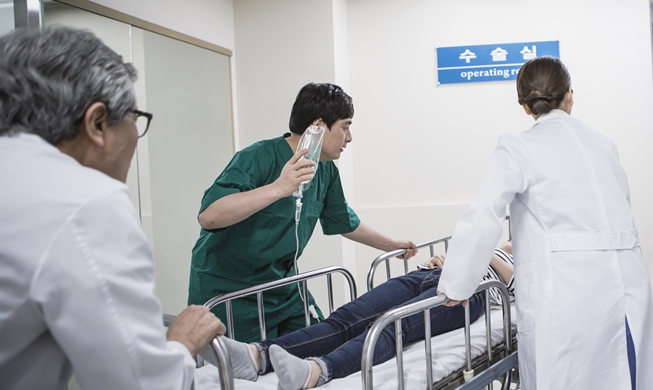- 한국어
- English
- 日本語
- 中文
- العربية
- Español
- Français
- Deutsch
- Pусский
- Tiếng Việt
- Indonesian
By Honorary Reporter Mitchell Blatt from U.S.
I arrived in Korea in mid-July.
After undergoing a series of additional checkpoints at customs, a government worker put a lanyard over my neck and directed me toward a group of other foreign arrivals. They took us straight to a bus that took us straight to a hotel, where we had the swabs stuck up our noses to test for COVID-19. We were then told to download a health check app and sent to our rooms, which we would not leave for the next 14 days.
This highly organized process enabled the provision of everything we needed in quarantine. Three times a day, workers delivered meals to our doors, and the food was sufficient to keep me full the whole day. Periodically, the "control center" made announcements to our rooms through our in-room speakers. If we needed something like extra trash bags, we could request it by email or phone. It wasn't exactly exciting being in quarantine for two weeks, however, as I really missed going outside. I saw a park outside my window that looked perfect for a stroll. The food wasn't too bad, but I grew tired of it. I was really craving Korean food. At least my room was nice, and I made a video tour of it for YouTube.
Yet staying in quarantine was worth it since the program keeps Korea safe. The number of new cases has stayed at a minimum for months since the initial outbreak. And cases imported from abroad are all tracked and monitored to prevent their spread. Because Korea has kept the coronavirus in check, businesses can remain open and people can go about life with relatively little fear. In contrast, other countries are seeing the pandemic further spread, and their people still don't feel safe leaving their homes. In many places in my native U.S., bars and gyms have had to close again.
When I left quarantine in late July after 14 days, a bus took me and others who were released to the nearest subway station, and I took the train into the city. Everyone riding the subway was wearing masks. This is a far cry from the U.S., where many refuse to wear masks because they find it annoying. Yet masks prevent the coronavirus from spreading, even in cases in which carriers display no symptoms. So if masks make the country and the world safer, this is a small price to pay.
Other countries battling the second wave of the pandemic can learn a lot from Korea. Certain nations require quarantine for international arrivals but hardly enforce the procedure. This leads to a porous safety net that threatens public safety. Other countries also do not provide meals to the quarantined, which leads some to leave their rooms in search of food. Korea, despite having had its fair share of quarantine mishaps early in the pandemic, learned from its mistakes and began to require quarantine at government-monitored hotels. This was the right choice.
Though being in quarantine is hardly the most amazing experience in the world, it is a necessity that greatly contributes to a safer and healthier society. If the alternative is having tens of thousands of new COVID-19 cases per day, quarantining is far more preferable. Many parts of America still have no mandatory quarantines, but due to the pandemic, many Americans are effectively forced to self-quarantine to protect themselves.
I certainly hope America can slow down the coronavirus, and I strongly suggest that Americans follow Korea's strategies.
chaey0726@korea.kr
*This article is written by a Korea.net Honorary Reporter. Our group of Honorary Reporters are from all around the world, and they share with Korea.net their love and passion for all things Korean.
Most popular
- Slew of festivals, events scheduled in downtown Seoul in May
- Korea.net welcomes 2025 K-influencers, Honorary Reporters
- 2025 Honorary Reporter class pledges to spread 'real Korea' worldwide
- US urged to exempt tariffs on Korea in first '2+2' trade talks
- Korean culture festival in Cuba marks 1st year of bilateral ties
